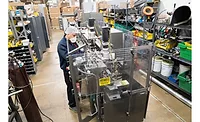Exclusive interview: Q&A with Dr. Errol Raghubeer, on HPP and the U.S. Listeria outbreak


Food Safety Strategies was recently able to talk to Dr. Errol Raghubeer, on the recent outbreak of Listeria and how HPP can help with the current outbreak, as well as future outbreaks.
Liz Parker: The CDC is currently investigating a multistate outbreak of Listeria that has resulted in one death and 10 people hospitalized. How can HPP help the current Listeria outbreak in the US?
Dr. Errol Raghubeer: HPP is proven intervention process to control Listeria in RTE meat. A large number of RTE meat companies are using HPP to eliminate the risks of foodborne pathogens such as Listeria monocytogenes, Salmonella, E. coli O157:H7 and other pathogens. Since there are indications that this listeria outbreak occur in both products sliced at deli counters and packaged retail products it is likely a single source manufacturer. HPP of both food service packages that are then sliced in delis and those in the final packages could have eliminated the outbreak.
LP: The CDC is currently determining if there is a specific type of deli meat or common supplier linked to the multistate outbreak of Listeria. In the past, how did HPP help resolve RTE meat and poultry industry Listeria recalls?
ER: HPP is an approved FSIS Post-Lethality Treatment (PLT) for the control of Listeria in RTE meat. HPP technology has been successfully used in the RTE meat and other segments in the food industry to ensure the microbial safety of foods and beverages. Since HPP’s early adoption in the 2000’s no company using HPP in any category of food or beverages has had product call. The FSIS issued a Letter-of-no objection in March 2003 in response to data submitted by AVURE Technologies for the use of HPP as a PLT for the control of Listeria in meat processing plants.
LP: What makes HPP more effective than standard processing for RTE meat and poultry products' shelf life?
ER: HPP is an antimicrobial process which inactivates vegetative pathogens, spoilage bacteria, yeast and molds. One of the common causes of short shelf-life of RTE meat products is the growth of spoilage bacteria, particularly strains of lactic acid bacteria (LAB). This is more of an issue with RTE meat products that do not contain chemical preservatives—a movement in the industry to meet customers’ demands. HPP is very effective in reducing these spoilage bacteria and eliminating yeasts and molds in products that do not contain chemical preservatives. It is very common that HPP RTE meats to achieve a shelf-life greater than 3 times in RTE meat compared to conventional processes. In microbial analyses comparing non-HPP vs. HPP commercial RTE meat products it is quite common to see that HPP products will get 120-days of shelf-life while the non-HPP product will start to show signs of spoilage within 45 days.
Looking for quick answers on food safety topics?
Try Ask FSM, our new smart AI search tool.
Ask FSM →
Additionally as described above for pathogen inactivation, HPP is generally applied to RTE meat in the final package so contamination that occurs during packaging are inactivated whereas, for products that are not treated in the final package, contamination during before and during final packaging can grow and shorten the shelf-life. It should be noted that high thermal treatment in the final package of some products such as hot dogs can also extend shelf-life but with a significant loss of organoleptic properties. For some products, thermal treatment cannot be used. For example, thermal treatment cannot be used in sliced deli meats and other deli style products such as chicken strips due to the significant loss of quality and damage to products.
LP: Why are RTE meats more prone to Listeria?
ER: With most foods such as sliced meat, Listeria is primarily an environmental contaminant. Meat processing plants and processing equipment are primary sources of Listeria contamination. Raw meat arriving from slaughter houses and other sources can bring the organism into RTE meat processing facilities. Listeria can tolerate extreme environments conditions and survive and form biofilms in processing surfaces and equipment that can be difficult to get rid of with normal sanitation procedures. One of the most significant avenue for contamination is from slicing equipment where the contamination occurs after the application of the lethality treatment such as heat, smoking, etc. It is a constant struggle for processors to maintain “sterility” of slicers which have shown to be a significant source of contamination of sliced meat. HPP is applied to RTE meat in the final package which prevents contamination of the product being sold to consumers.
LP: What food companies in the U.S. and globally does JBTAvure work with to prevent listeria?
We work with all of our customers globally in the application of HPP in the RTE meat industry. In the earlier days of HPP implementation, AVURE worked closely with Hormel Foods and Perdue Farms in the early to mid-2000’s who were the first adopters of HPP for RTE meats. Similarly, in the US and Canada we conducted pathogen challenge studies and provide regulatory guidance to a number of customers, including meetings with FSIS inspectors and other regulatory bodies to fully explain the efficacy of HPP. Some of these customers include Burgers’ Smokehouse, Saddlers as well as customers in Canada and Latin America. Similar support were given and continue to be provided to our customers across Europe and Asia Pacific countries.









